Extremism and terrorism on the Internet as crimes in the field of computer information on a global scale
- Authors: POPOVA E.A.1, KUZNETSOVA I.S.2
-
Affiliations:
- Derzhavin Tambov State University
- Tambov Regional Court
- Issue: Vol 7, No 4 (2023)
- Pages: 601-609
- Section: Материальное право
- URL: https://journal-vniispk.ru/2587-9340/article/view/303750
- ID: 303750
Cite item
Abstract
In modern conditions of informatization, the population is faced with problems of a different nature, as well as various forms of manifestation. The problem is considered, which has a universal character, which on a global scale represents the spread of the ideology of terrorism and extremism. At the moment, the world community is making enormous efforts to develop the latest methods and means of combating these particularly serious crimes, such as extremism and terrorism, their consequences are cruel and sometimes even irreparable. When studying issues related to extremism and terrorism on the Internet, well-known theoretical methods were used: deduction and induction, analysis and synthesis. The use of the formal legal method of private law made it possible to study and evaluate the texts of regulatory legal acts. The purpose of study is to analyze the general characteristics of extremism and terrorism on the Internet as an illegal act committed in the field of computer information on a global scale, as well as to identify and resolve the most pressing and controversial issues, both theoretically and practically, in relation to the problem under consideration. Today, terrorists and extremists are increasingly using the sphere of telecommunications and computer information to realize their criminal intentions. Let us note that extremist and terrorist crimes committed specifically using the sphere of computer information pose global threats, are very dangerous and serious not only for Russian society and the state, but also for the world community in general. The damage caused by these types of crimes is growing exponentially.
About the authors
Elena A. POPOVA
Derzhavin Tambov State University
Email: elenap2672@yandex.ru
ORCID iD: 0000-0002-6903-1775
PhD (Law), Associate Professor, Head of Criminal Law and Procedure Department, Law and National Security Institute
Russian Federation, 33 Internatsionalnaya St., Tambov, 392000, Russian FederationIrina S. KUZNETSOVA
Tambov Regional Court
Author for correspondence.
Email: irinakis_is15@mail.ru
ORCID iD: 0009-0006-4301-1967
Court Secretary
Russian Federation, 8 Kommunalnaya St., Tambov, 392000, Russian FederationReferences
- Styazhkina S.A. (2021). Criminal-legal features of the qualification of violations of the rules of operation of means of storage, processing or transmission of computer information and information and telecommunications networks (article 274 of the criminal code of the Russian Federation). Vestnik Udmurtskogo universiteta. Seriya «Ekonomika i pravo» = Bulletin of Udmurt University. Series Economics and Law, no. 3, pp. 489-496. (In Russ.) https://doi.org/10.35634/2412-9593-2021-31-3-489-496, https://elibrary.ru/cjnjmw
- Chernyakova A.V. (2018). International and foreign experience of criminal law counteraction to thefts committed by using computer information. Yuridicheskaya nauka i pravookhranitel’naya praktika = Legal Science and Law Enforcement Practice, no. 4 (46), pp. 168-179. (In Russ.) https://elibrary.ru/yxrbdf
- Atnashev V.R. (2019). International cooperation on cybercrime and cyberterrorism. Evraziiskaya integratsiya: ekonomika, pravo, politika = Eurasian Integration: Economics, Law, Politics, no. 3 (29), pp. 37-42. (In Russ.) https://elibrary.ru/avhdyz
- Ishchenko E.P. (2014). Virtual’nyi criminal [Virtual Crime]. Moscow, Prospekt Publ., 228 p. (In Russ.)
- Gevorgyan E.M. (2021). Cyber terrorism as a national safety’s threat of Russian Federation. Skif. Voprosy studencheskoi nauki = Sciff. Questions of Student Science, no. 6 (58), pp. 118-122. (In Russ.) https://elibrary.ru/puppdf
- Motorina T.S., Shamsudinova V.V. (2020). Cyber terrorism as a national safety’s threat of Russian Federation. Nauchnye issledovaniya XXI veka [Scientific Research of the 21st Century], no. 3 (5), pp. 168-172. (In Russ.) https://elibrary.ru/bbmfgg
- Serebrennikova A.V. (2021). Cyber terrorism: causes and conditions. Colloquium-Journal, no. 17 (104), pp. 47-49. (In Russ.) https://doi.org/10.24412/2520-6990-2021-17104-47-49, https://elibrary.ru/tjrxhe
- Grigor’ev N.V. (2017). Vliyanie kiberterrorizma na molodezhnuyu sredu [The impact of cyberterrorism on youth]. Vestnik natsional’nogo antiterroristicheskogo komiteta = Herald of the National Antiterrorism Committee, no. 2, pp. 5-8. (In Russ.)
- Malik E.N. (2020). Cyberterrorism as a world threat: challenges and measures of struggle. Vestnik Prikamskogo sotsial’nogo institute = Bulletin of Prikamsky Social Institute, no. 1 (85), pp. 169-173. (In Russ.) https://elibrary.ru/qqjhod
- Butenko A.S. (2019). Extremism on the Internet: the concept and the essence. Yurist”-Pravoved” [Jurist-Lawyer], no. 2 (89), pp. 57-61. (In Russ.) https://elibrary.ru/pxvdkl
Supplementary files








